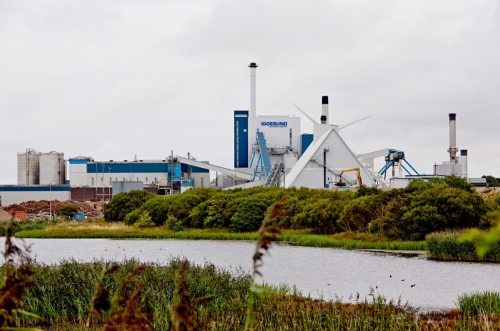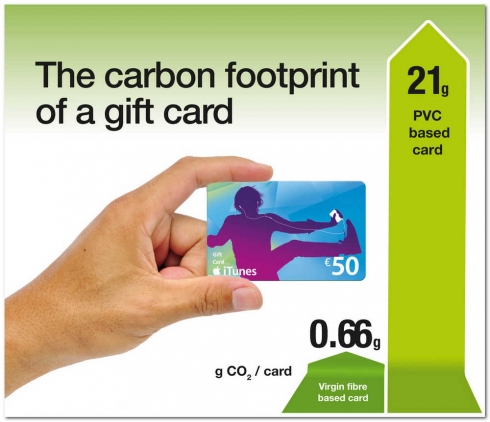Displaying items by tag: Iggesund Paperboard
Iggesund Paperboard at the top again
Paperboard manufacturer Iggesund Paperboard’s market-leading brands Invercote and Incada are again among the three most valuable brands on the European paperboard market, concludes a newly released brand survey of European paperboard converters and brand owners done by Opticom International Research.
The converters chose Invercote as the clear leader, significantly ahead of number two, Performa from Stora Enso. Incada placed third among the 14 brands that qualified for the list of European leaders, according to the converters. Value for money and quality consistency are the most important factors for converters’ choice of paperboard. Their highest service priorities are availability and delivery reliability.
“We rarely comment negatively about Incada’s quality and we always receive excellent technical service,” said a UK converter specialising in cosmetics and other beauty products.
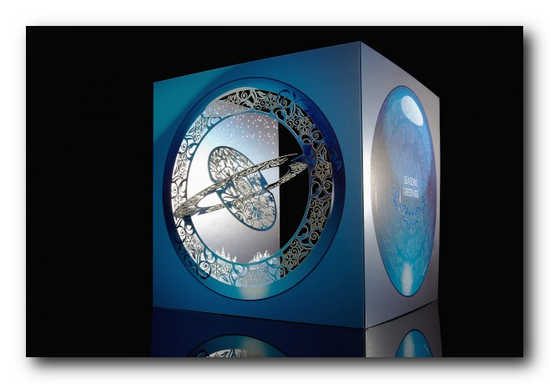
“Invercote has been our main paperboard choice for many years and it functions well in our production,” said another UK converter with a more general focus.
“We’re incredibly pleased and proud of our wonderful and strong brands, which are so important to our customers, colleagues and businesses,” comments Charlotte Lagerwald, Marketing Strategy Director, who is responsible for managing and caring for Iggesund’s brands. “When our customers and other stakeholders also rank us so highly, it proves we are doing the right things and also helping our customers to be successful.”
Both the company Iggesund Paperboard and its product brands Invercote and Incada have a high and growing recognition factor. Given that Iggesund’s competitors, Stora Enso and Metsä Board, are both considerably bigger companies, this high recognition is even more notable.
Opticom also produces a corresponding ranking of paperboard brands based on interviews with owners of consumer brands in six market segments: dry foods, chilled & frozen foods, chocolate & confectionary, wines & spirits, fragrances, cosmetics & beauty care, and pharmaceuticals. Both Invercote and Incada are the leaders with a wide margin, coming first and second respectively in the segments of fragrances and cosmetics & beauty care.
“Of course the study is limited to Europe but it still reinforces our sales reasoning as we try to broaden and increase our sales in both Asia and the US,” comments Arvid Sundblad, VP Director Sales & Marketing and in charge of Iggesund Paperboard’s global sales. “Our new service solutions in Asia and on the US West Coast give us a new competitiveness in these markets that we previously lacked. In addition, European brand owners who manufacture in Asia can now be more secure in knowing that they can use Invercote there as well.”
Caption: Invercote is the most valuable brand on the European paperboard market and Iggesund Paperboard’s other brand, Incada, is ranked third. The photo shows a card with extreme laser cutting designed by Van Heertum Design, Tilburg, the Netherlands.© Iggesund
Iggesund
Iggesund Paperboard is part of the Swedish forest industry group Holmen, one of the world’s 100 most sustainable companies listed on the United Nations Global Compact Index. Iggesund’s turnover is just over €500 million and its flagship product Invercote is sold in more than 100 countries. The company has two brand families, Invercote and Incada, both positioned at the high end of their respective segments. Since 2010 Iggesund has invested more than €380 million to increase its energy efficiency and reduce the fossil emissions from its production.
Iggesund and the Holmen Group report all their fossil carbon emissions to the Carbon Disclosure Project. The environmental data form an integral part of an annual report that complies with the Global Reporting Initiative’s highest level of sustainability reporting. Iggesund was founded as an iron mill in 1685, but has been making paperboard for more than 50 years. The two mills, in northern Sweden and northern England employ 1500 people.
Iggesund focuses on Japan
Iggesund Paperboard is expanding in the Asia Pacific region and will open a sales office in Japan from 1 September. Over the past year Iggesund has established a service centre with sheeting and warehousing in Taiwan to cut lead times in the region.
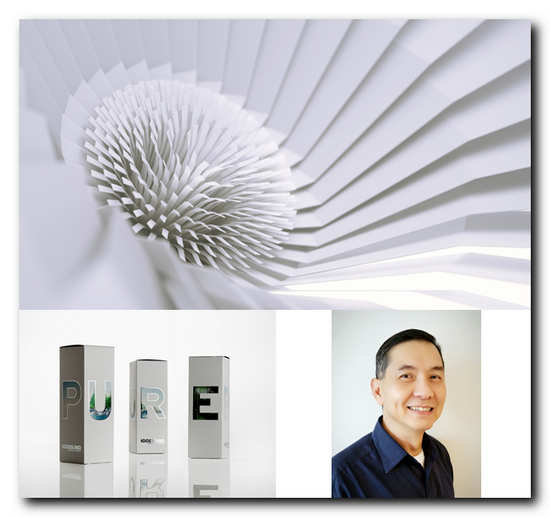
“We have great respect for Japanese business culture and are therefore only recruiting Japanese staff. We believe that this factor, together with our long-term commitment, will be decisive to succeeding in Japan,” says Ivan Chong, President of Iggesund’s Asia Pacific operations. © Iggesund
“Traditionally Iggesund has focused very much on Europe but we are now prioritising work to increase our global sales,” explains Arvid Sundblad, Vice President Sales and Marketing for Iggesund. “For more than a decade we have seen the conversion of packaging for consumer goods move from western Europe to other parts of the world, mostly in the east,” he says. “Brand owners with headquarters in one part of the world can have the manufacturing of both their goods and packaging in another. This is globalisation in a nutshell and we must adapt to it.”
The Japanese paper and paperboard market is known for its high demands on quality. Iggesund’s flagship product, Invercote, will be the cornerstone of the new venture. The paperboard is well established in the highest quality segments in the more than 100 national markets where it is sold. It is made of virgin fibre and meets exacting standards of purity, so it should do well in Japan.
“When we decided to focus more on global sales, one of the first steps was to develop our delivery service outside Europe,” explains Ivan Chong, President of Iggesund’s Asia Pacific operations. “Since then we’ve built up new inventory and sheeting facilities on the US West Coast and in Taiwan. The result is radical reductions in lead times to Asia.”
Iggesund has been represented in both Singapore and Hong Kong for almost two decades now and has been successful in building sales over that period. The improved availability means there are good prospects for the company to reach a wider market not only in Japan but also in the Asia Pacific region generally.
“The improved inventory and service are a game changer for us,” Chong says. “Now we can be competitive in contexts where before we weren’t even an option due to the lead times. We’ve already gained a number of new orders due to our new delivery capacity.”
“We have great respect for Japanese business culture and are therefore only recruiting Japanese staff,” Chong explains. “We believe that this factor, together with our long-term commitment, will be decisive to succeeding in Japan.
“Quality is extremely important in Japan,” he continues. “Hygiene, purity, and taste and odour neutrality are just some of the aspects that are emphasised more in this market than in many others. That’s why we believe Invercote has terrific opportunities to do well here.”
Invercote has long been represented by the esteemed Japanese paper merchants Takeo with a focus on the graphics market and this arrangement will continue. The new sales office will further develop new business opportunities in the premium packaging and graphical segments, where the qualities of Invercote are especially preferred.
“We believe it is a clear advantage to have two channels into this demanding market,” Arvid Sundblad concludes.
Iggesund
Iggesund Paperboard is part of the Swedish forest industry group Holmen, one of the world’s 100 most sustainable companies listed on the United Nations Global Compact Index. Iggesund’s turnover is just over €500 million and its flagship product Invercote is sold in more than 100 countries. The company has two brand families, Invercote and Incada, both positioned at the high end of their respective segments. Since 2010 Iggesund has invested more than €380 million to increase its energy efficiency and reduce the fossil emissions from its production.
Iggesund and the Holmen Group report all their fossil carbon emissions to the Carbon Disclosure Project. The environmental data form an integral part of an annual report that complies with the Global Reporting Initiative’s highest level of sustainability reporting. Iggesund was founded as an iron mill in 1685, but has been making paperboard for more than 50 years. The two mills, in northern Sweden and northern England employ 1500 people.
Upgraded Invercote G gets Quick Printing award
The US newsletter Quick Printing conducted their 3rd annual Readers’ Choice Top Products Awards competition in mid-2015. The newsletter is targeting people in the quick printing business globally, and the goal was to gather opinions from print service providers about what they consider to be the most significant products introduced to the commercial printing industry over the last 15 months. Voting was open to all print service providers worldwide.
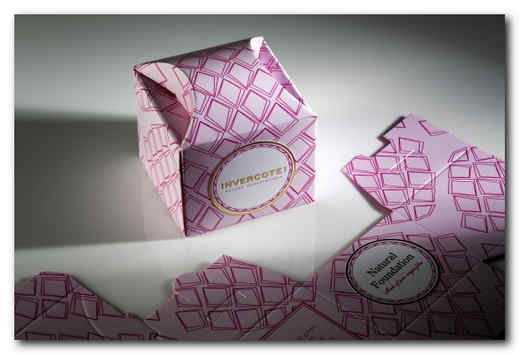
In the category Digital Print Media Upgraded Invercote G from Iggesund Paperboard was voted to be the best choice with the following motivation:
“Invercote G is certified for a variety of digital print technologies and is recognized as the market leader by digital printers when they need a thicker or stiffer material than usual. The upgraded Invercote G gives customers who want a clear difference between the paperboard’s two sides but who still want to be able to print on both sides using their digital presses precisely what they’re looking for.
The secret lies in the new coating on the reverse side of the upgraded Invercote G. Iggesund’s engineers created a reverse side with improved printing properties – in both offset and digital – but without compromising on the natural feel that has been the product’s hallmark for many years.”
Jannes Dahlgren, CEO at the Swedish digital printing house Digaloo is not surprised by the award.
“The improved printability on the reverse side has taken Invercote G to a new level for digital printing. We can use it for a larger range of print and packaging applications than before”, he says.
The award will be given to Iggesund at a ceremony at GraphExpo 15 in Chicago on Sunday September 13th.
Iggesund
Iggesund Paperboard is part of the Swedish forest industry group Holmen, one of the world’s 100 most sustainable companies listed on the United Nations Global Compact Index. Iggesund’s turnover is just over €500 million and its flagship product Invercote is sold in more than 100 countries. The company has two brand families, Invercote and Incada, both positioned at the high end of their respective segments. Since 2010 Iggesund has invested more than €380 million to increase its energy efficiency and reduce the fossil emissions from its production.
Iggesund and the Holmen Group report all their fossil carbon emissions to the Carbon Disclosure Project. The environmental data form an integral part of an annual report that complies with the Global Reporting Initiative’s highest level of sustainability reporting. Iggesund was founded as an iron mill in 1685, but has been making paperboard for more than 50 years. The two mills, in northern Sweden and northern England employ 1500 people.
Further information:
Staffan Sjöberg
Public Relations Manager
This email address is being protected from spambots. You need JavaScript enabled to view it.
Iggesund Paperboard
SE-825 80 Sweden
Tel: +4665028256
Mobile: +46703064800
www.iggesund.com
Iggesund expanding services for Russia
Iggesund Paperboard is expanding its services for Eastern Europe by establishing a new freight terminal in Riga, Latvia, and a sales office in Moscow to boost Russian sales. The newly established units are a step forward in Iggesund’s long-term plan to cultivate its delivery services on a global scale.
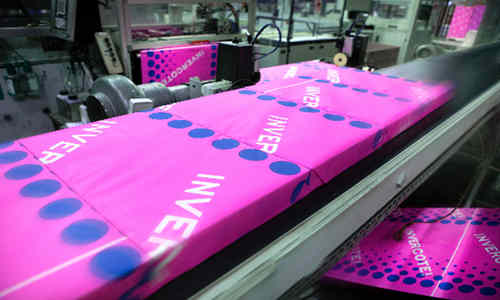
“We need to be near the customer both in terms of deliveries and other services required by today’s customers,” says Rikard Papp, Director Asia Pacific & Merchants Europe at Iggesund.
Due to Iggesund’s interest in the Russian markets, the company will, for the second time, be taking part in the RosUpack exhibition in Moscow.
“The intense interest we met with last year convinced us that we should establish a sales office for the Russian market. It is a major market that definitely has room for a high-end product like Invercote,” says Rikard Papp.
Iggesund’s service offering is not just about deliveries. The newly launched Care by Iggesund is a comprehensive and improved service concept. Steady lead times are the main goal, but everything from fast sample service and knowledge transfer to local technical support and transparent raw material supply are also part of the package.
“We don’t want customers who choose Invercote to just sleep well at night. They can also rest assured that the end result will be dazzling,” Rikard Papp says.
Iggesund Paperboard’s terminal in Riga has been operational since April and the sales office in Russia will be inaugurated in July.
Caption: “Russia is a hugely promising major market that definitely has room for a high-end product like Invercote,” says Rikard Papp. ©Iggesund
Iggesund
Iggesund Paperboard is part of the Swedish forest industry group Holmen, one of the world’s 100 most sustainable companies listed on the United Nations Global Compact Index. Iggesund’s turnover is just over €500 million and its flagship product Invercote is sold in more than 100 countries. The company has two brand families, Invercote and Incada, both positioned at the high end of their respective segments. Since 2010 Iggesund has invested more than €380 million to increase its energy efficiency and reduce the fossil emissions from its production.
Iggesund and the Holmen Group report all their fossil carbon emissions to the Carbon Disclosure Project. The environmental data form an integral part of an annual report that complies with the Global Reporting Initiative’s highest level of sustainability reporting. Iggesund was founded as an iron mill in 1685, but has been making paperboard for more than 50 years. The two mills, in northern Sweden and northern England employ 1500 people.
Further information:
Staffan Sjöberg
Public Relations Manager
This email address is being protected from spambots. You need JavaScript enabled to view it.
Iggesund Paperboard
SE-825 80 Sweden
Tel: +4665028256
Mobile: +46703064800
www.iggesund.com
ANDRITZ to supply new press section at Iggesund Paperboard, Workington, England
International technology Group ANDRITZ has received an order from Iggesund Paperboard to install a complete press section for the board machine 2 at the Workington mill, England. Start-up is scheduled for the second quarter of 2016.
ANDRITZ will deliver a turnkey new press section, including a PrimePress X shoe press and a new PrimeFeeder for tail threading from press section to dryer section. The scope of supply also includes a new press pulper, field instrumentation, machine control systems, electrification, and new press section drives. The new press section will increase production capacity and improve energy efficiency, runability, and product quality.
The Workington mill produces high-performance paperboard used for consumer packaging and graphical products.
The ANDRITZ GROUP
ANDRITZ is a globally leading supplier of plants, equipment, and services for hydropower stations, the pulp and paper industry, the metalworking and steel industries, and for solid/liquid separation in the municipal and industrial sectors. The publicly listed technology Group is headquartered in Graz, Austria, and has a staff of almost 25,000 employees. ANDRITZ operates over 250 sites worldwide.
ANDRITZ PULP & PAPER
The business area is a leading global supplier of equipment, systems, and services for the production and processing of all types of pulps, paper, tissue, and cardboard. The technologies cover the processing of logs, annual fibers, and waste paper; the production of chemical pulp, mechanical pulp, and recycled fibers; the recovery and reuse of chemicals; the preparation of paper machine furnish; the production of paper, tissue, and board; the calendering and coating of paper; as well as treatment of reject materials and sludge. The service range includes modernization, rebuilds, spare and wear parts, service and maintenance, as well as machine transfer and second-hand equipment. Biomass, steam, and recovery boilers, as well as gasification plants for power generation, flue gas cleaning plants, production equipment for biofuel (second generation), biomass torrefaction equipment, plants for the production of nonwovens, dissolving pulp, plastic films, and panelboards (MDF), and recycling plants are also allocated to the business area.
For further information, please contact:
Oliver Pokorny
Head of Corporate Communications
This email address is being protected from spambots. You need JavaScript enabled to view it.
Virgin fibre a necessity in chocolate packaging
“When we choose the paperboard for chocolate packaging, the decisive factor is taste and odour neutrality. Of course the paperboard must be suitable for the construction we have chosen but if we do not minimise the risk of the chocolate acquiring an off-taste from the packaging material then the rest does not matter.”
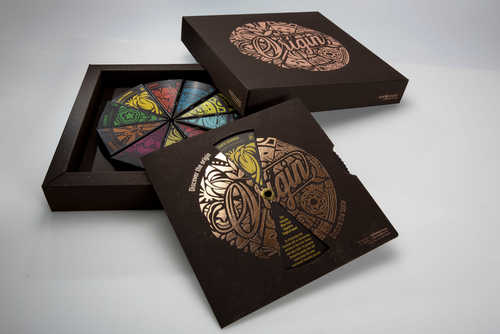
The Origin Box is made of three kinds of paper material, of which two, Invercote and Incada, are made by Iggesund Paperboard
Tom Du Caju and his colleagues at Du Caju Printing & Packaging in Belgium are describing their experiences in food packaging. Du Caju is located in Erpe-Mere, just west of Brussels. With almost 50 employees and annual net sales of EUR 10 million, the company regards itself as a medium-sized Belgian converter. Of the packaging Du Caju produces, 85 per cent is food related and 11 per cent is chocolate packaging.
“In addition, just over ten per cent of what we do is packaging with direct contact between the food and the packaging material,” says key account manager Koen Penne. “We are choosing our food contact materials such as paperboard very carefully to avoid taint, odour and migration problems.”
Du Caju has been working with the world’s largest chocolate producer Barry Callebaut, for more than 25 years. The converter is regularly asked to create sophisticated promotional packaging for Callebaut as a sales tool and brand enhancer. The latest creation, The Origin Box, has an outer box made of a brown-coloured speciality paper from James Cropper, Colorscope Bitter Chocolate 350 g/m2. Inside the box are samples of chocolate from many countries. Each sample is packed in a wedge-shaped box made of Incada Silk 300 g/m2 from Iggesund Paperboard. The box also features a wheel giving information about the different types of chocolate. The wheel is printed on Invercote Creato 400 g/m2, also from Iggesund Paperboard,and is covered with the same material as the outer box.
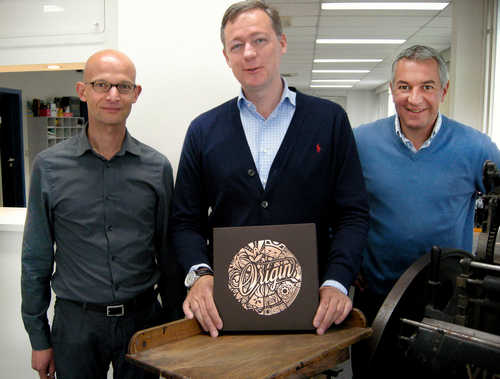
Erwin Heeren, Tom Du Caju and Koen Penne of Du Caju Printing & Packaging proudly display The Origin Box
The brown material has a very matt appearance and a very natural look. The brown colour and the uncoated sides give a very good indication of the look of chocolate.The Origin Box was a finalist in the ECMA/Pro Carton European packaging award competition in 2014.
“We have learned from experience that only virgin fibre is good enough for this type of packaging,” comments Erwin Heeren, an experienced purchaser at Du Caju. “In choosing materials we also get support from our customer, Barry Callebaut, who tests all packaging materials for up to sixty days in its own sensory laboratory.”
As a purchaser he must also keep up to date with both the environmental debate and the discussion about how mineral oils in recycled-fibre-based materials can contaminate packaged foods.
“We are following the mineral oil debate with great interest, as are our most knowledgeable customers,” Erwin Heeren says. “However, we are not seeing any increased demand for traceability certificates for paperboard materials – neither FSC nor PEFC. That demand is constant at between three and five per cent of our total volume.”
Invercote upgrade an adaptation to market demands
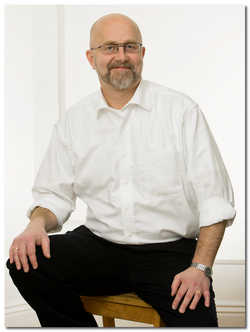 Iggesund Paperboard announces an upgrade to its flagship product, Invercote. From summer 2015 the bestselling paperboard in the Invercote family, Invercote G, will feature a lightly coated reverse side.
Iggesund Paperboard announces an upgrade to its flagship product, Invercote. From summer 2015 the bestselling paperboard in the Invercote family, Invercote G, will feature a lightly coated reverse side.
“More and more brand owners want to have access to high-quality reverse side printing, for example in order to print a colour shade or pattern which improves recognition and reinforces their brand,” comments Arvid Sundblad, Vice President Sales and Marketing at Iggesund Paperboard. “We are developing Invercote step by step, and always in the direction our customers want.”
Prior to this latest upgrade, Invercote G has been triple-coated on the print side with an uncoated reverse and is available in grammages from 180 to 380 g/m2. Over the years it has come to be the quality leader, primarily due to the combination of excellent printing and foil laminating properties together with high quality and an equally high quality consistency. One of the many reasons to choose it as a graphic or packaging material has been the high predictability of the end result.
Coating the reverse side means that the whiteness on the reverse has also been adjusted up. Further improvement has also been made to the lightfastness, which was already the best on the market, and which is crucial for a package to keep looking fresh over time on the retail shelf.
”This is not a revolution but rather an adaptation to gradually changing customer demands. The reverse side coating is very light – it improves the printing properties, but still keeps the tactile feeling of roughness,” Sundblad continues. “But in making this change we have also preserved all the other properties that have repeatedly led to Invercote being ranked by leading brand owners as the European paperboard market’s strongest brand.”
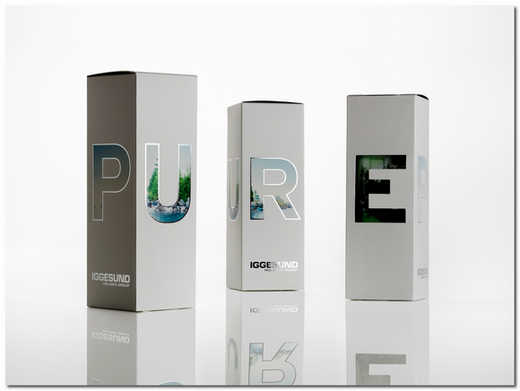
Concurrently with the introduction of the upgraded Invercote G, Iggesund has also improved and made more transparent its service offering under the name Care by Iggesund. The aim is consistent delivery times but the offering also encompasses everything from a rapid sample service and the dissemination of knowledge to local technical support and a transparent raw materials supply.
“It’s crucial to us that anyone who chooses Invercote will not only sleep well at night but also know that the end result will be dazzling,” Sundblad concludes.
Specifications for the upgraded Invercote G as well as sample and trial material will be available from early February. Deliveries will start July 1st.
Paperboard gift cards lessen the environmental impact of Christmas
What can we give as a Christmas present when we don’t know what the other person wants? A gift card is one option that always works. But gift cards have changed over the past decade or so. What used to be a written commitment has become packaged offerings of money, experiences, music or other items, often in the form of a credit-card-sized PVC card.
How do these plastic cards in our wallets affect the environment? Estimates in the United States conclude that five new cards are produced there per inhabitant per year. The equivalent for Europe would mean the production of 2.5 billion cards annually, resulting in the emission of 52,500 tonnes of fossil carbon dioxide.
“If we replaced those plastic cards with ones made of virgin fibre paperboard, the emissions would only be one-thirtieth of what comes from making the plastic cards in the best scenario,” explains Jonas Adler, Business Development Director for Iggesund Paperboard.
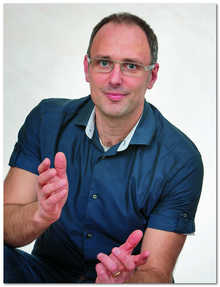 In the United States a debate about the carbon emissions from all these plastic gift, discount and membership cards has been going on for some years now and has led to a growing demand for gift cards made of paperboard. This trend is now making its way to Europe.
In the United States a debate about the carbon emissions from all these plastic gift, discount and membership cards has been going on for some years now and has led to a growing demand for gift cards made of paperboard. This trend is now making its way to Europe.
“A number of American manufacturers have chosen paperboard as the base material for their cards for environmental reasons,” Adler says. “European manufacturers are now also considering the environmental effects of their choice of material. Normally Europe is ahead of the US when it comes to reducing this type of emission but in this case we are lagging behind.”
Driving the new trend is the difference in carbon footprint between the two materials. A paperboard card weighs just over half as much as a plastic card. The paperboard card leads to the release of only one-thirtieth of the amount of fossil carbon produced from making the plastic cards, based on the published values for Iggesund’s Invercote Duo paperboard and the plastics used for the cards.
Invercote Duo, which is one of Iggesund’s standard products, performs well in the card manufacturers’ processes and has been a success among American card manufacturers.
Even though the difference in emissions between the two card materials is huge, this is not the most urgent environmental issue but it can be an important symbolic step for a company to take.
“For a company that issues hundreds of thousands of plastic cards, the difference in environmental impact is great enough that it cannot be ignored,” comments Ola Buhrman, Technical Product Manager of the card product line. “Our experiences from the US and the fact that we have a standard product which functions like clockwork in the processes make us very competitive. And it’s technically easy for card producers to switch materials.”
He emphasises that Invercote Duo meets ISO/IEC 7810 and 7811, which specifies the dimensional stability and flatness required for the gift cards to function in a card reader. Invercote can handle complex printing processes and finishing steps like embossing, and it is not difficult to integrate a magnetic strip or a chip. For extra durability a bio-degradable coating layer can be applied.
Invercote is made at Iggesund Mill in Sweden. Bioenergy supplies more than 98 per cent of the mill’s energy needs and Invercote has one of the smallest carbon footprints on the paperboard market. In 2012 Iggesund Paperboard had its highest production level ever while simultaneously having the lowest emissions of environmentally harmful substances since it began manufacturing paper products almost a century ago.
“Yet another advantage of Invercote is that it can be supplied made from certified raw material and it is certified compostable in accordance with the EN 13432 standard,” Jonas Adler concludes. “All in all, it’s a perfect base material for all gift card manufacturers who want to minimise their environmental impact.”
Bold action to improve service
Iggesund Paperboard is now taking bold action to improve its service. The company offers its customers a wide range of services but most important is its delivery service. Like most other paperboard manufacturers, Iggesund – and not least its customers – has suffered from delivery times that have varied considerably.
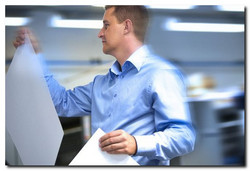 “Having a capacity utilisation rate of almost 95 per cent makes you very sensitive to fluctuations in demand, especially when that demand increases,” explains Arvid Sundblad, Vice President Sales and Marketing for Iggesund. “In the past we’ve had a number of such experiences and we don’t want either ourselves or our customers to go through that again.”
“Having a capacity utilisation rate of almost 95 per cent makes you very sensitive to fluctuations in demand, especially when that demand increases,” explains Arvid Sundblad, Vice President Sales and Marketing for Iggesund. “In the past we’ve had a number of such experiences and we don’t want either ourselves or our customers to go through that again.”
A logistics team has been working for a couple of years to gradually improve the situation. Just over six months ago Iggesund launched the greatly modernised support system that forms the foundation for the improved delivery service.
“The change of systems was so radical that it was about the same as doing a heart-lung transplant plus a full body blood transfusion in a human being,” Sundblad adds. “This reorganisation has created the conditions for us to start moving towards constant delivery times but that will take time.”
Iggesund’s delivery service solution ranges from overnight service from dedicated customer stocks to regular deliveries from the mill, with several more options in between. Further development will occur over the next 12 months.
Iggesund’s service offering also encompasses everything linked to the products Invercote and Incada, from technical support in local markets to the paperboard expertise the company offers with its range of reference materials.
“We don’t just want customers to buy our paperboard,” Sundblad says. “It’s important to us that they also get the most out of it. All our documentation and our teams of locally based technicians with their experience of projects and processes similar to our customers’ exist to make sure that happens.
“We’ve offered some of this support for a long time but we haven’t made it clear enough to the majority of our customers that this service is available.”
Other features of the service offering, which is now being launched under the name “Care by Iggesund”, are the fast, easy ordering of samples and inspirational materials, the provision of product safety information and certificates, and access to the analytical services of Iggesund’s accredited Laboratory for Chemical and Sensory Analyses. Iggesund’s extensive environmental documentation is also part of the service, not least as a guarantee that customers will have no unpleasant surprises about the origin of their forest raw material.
Iggesund
Iggesund Paperboard is part of the Swedish forest industry group Holmen, one of the world’s 100 most sustainable companies listed on the United Nations Global Compact Index. Iggesund’s turnover is just over €500 million and its flagship product Invercote is sold in more than 100 countries. The company has two brand families, Invercote and Incada, both positioned at the high end of their respective segments. Since 2010 Iggesund has invested more than €380 million to increase its energy efficiency and reduce the fossil emissions from its production.
Iggesund and the Holmen Group report all their fossil carbon emissions to the Carbon Disclosure Project. The environmental data form an integral part of an annual report that complies with the Global Reporting Initiative’s highest level of sustainability reporting. Iggesund was founded as an iron mill in 1685, but has been making paperboard for more than 50 years. The two mills, in northern Sweden and northern England employ 1500 people.
Further information:
Staffan Sjöberg
Public Relations Manager
This email address is being protected from spambots. You need JavaScript enabled to view it.
Iggesund Paperboard
SE-825 80 Sweden
Tel: +4665028256
Mobile: +46703064800
www.iggesund.com
Iggesund’s investments led to sought-after industry award
 Over the past four years Iggesund Paperboard has invested more than 370 million euro to improve the energy solutions at its paperboard mills in Iggesund, Sweden and Workington, England. Compared with the situation a decade ago, the company has succeeded in reducing its fossil carbon emissions by more than 260,000 tonnes of carbon dioxide from fossil sources. The reduction is the equivalent of taking 85,000 cars, each driven 10,000 kilometres a year, off the road. It is against the background of these investments that the industry organisation PPI awarded its Bio Strategy of the Year prize to Iggesund Paperboard at the beginning of October.
Over the past four years Iggesund Paperboard has invested more than 370 million euro to improve the energy solutions at its paperboard mills in Iggesund, Sweden and Workington, England. Compared with the situation a decade ago, the company has succeeded in reducing its fossil carbon emissions by more than 260,000 tonnes of carbon dioxide from fossil sources. The reduction is the equivalent of taking 85,000 cars, each driven 10,000 kilometres a year, off the road. It is against the background of these investments that the industry organisation PPI awarded its Bio Strategy of the Year prize to Iggesund Paperboard at the beginning of October.
“We’re very pleased with the award but even more with the major move we’ve made from fossil fuel to bioenergy,” comments Arvid Sundblad, Vice President Sales and Marketing for Iggesund. “Of course that’s because we’re assuming our own responsibility for the climate issue but also because it will give us more stable energy costs over time.”
At the mill in Workington, where Incada is made, Iggesund has implemented a dramatic shift from fossil natural gas to biomass. A new biomass boiler was completed in the spring of 2013 and has contributed to a big reduction of Incada’s carbon footprint. Today Incada is among the folding box boards with the lowest values in this respect. At Iggesund, where the company produces Invercote, a new recovery boiler has helped to minimise the mill’s fossil carbon dioxide emissions and has also enabled the mill to often operate without using any fossil fuel at all. The goal is for the mill to be powered only by biomass and also to be self-sufficient in both electricity and heat.
“This is very gratifying,” Sundblad says. “The world is pressuring us to reduce our fossil carbon emissions and we’re living up to that. We’re thereby helping to support public policy goals and at the same time we also expect to stabilise our energy costs.”
As well as switching its energy source from fossil to renewable fuel, Iggesund has also worked to improve its energy efficiency. Producing one tonne of Invercote now requires just over ten per cent less energy than was needed five years ago. The mill in Workington has achieved a similar result. The new incineration plants are part of the explanation but so are patient efforts to continually improve the mills’ internal processes and make them more efficient. At Iggesund this process has also led to tangible improvements to the local environment.
“We’ve succeeded in reducing our sulphur emissions to air, and our particulate emissions to air by 50 per cent,” Sundblad emphasises. “This has been done from what were already low levels but it is still gratifying. For example, our mill, which dominates the municipality of Iggesund, is now only responsible for 1 per cent of the municipality’s particulate emissions.”
Iggesund Paperboard’s practice for many years has been to include sustainability issues as part of every investment decision.
“We don’t just take big steps – above all, we take many small steps because sustainability must be taken into account in every individual investment. We’re a capital-intensive industry but once the ball has been set in motion then it’s done with vigour,” Sundblad concludes.

